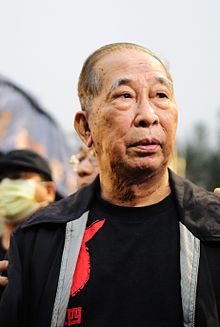Szeto Wah
Szeto Wah | |
|---|---|
 Szeto Wah at the 21st anniversary candlelight vigil in Causeway Bay, Hong Kong | |
| Chairman of Hong Kong Alliance in Support of Patriotic Democratic Movements in China | |
| Assumed office 21 May 1989 | |
| Member of the Legislative Council (Education) | |
| In office 1985 - 1991 | |
| Member of the Legislative Council (Kowloon East) | |
| In office 1991 - 2004 | |
| Succeeded by | Albert Cheng |
| Personal details | |
| Born | 28 February 1931 Hong Kong |
| Nationality | Chinese - Hong Kong Special Administrative Region/ British National (Overseas) |
| Political party | The Hong Kong Alliance in Support of Patriotic Democratic Movements in China |
| Residence | Hong Kong |
| Alma mater | Queen's College, Hong Kong Grantham College of Education |
| Profession | Politician |
| Szeto Wah | |||||||
|---|---|---|---|---|---|---|---|
| Traditional Chinese | 司徒華 | ||||||
| Simplified Chinese | 司徒华 | ||||||
| |||||||
Szeto Wah (born 28 February 1931, hometown Hoi Ping), currently the chairman of The Hong Kong Alliance in Support of Patriotic Democratic Movements in China, was a member of the Legislative Council from 1985 to 1997 and 1998 to 2004. Aside from his political career, Szeto is also well known for his Chinese calligraphy skills. He is sometimes known affectionately as "Uncle Wah" (華叔) by the local population.
Biography
Szeto was formerly a primary school principal, and chairman of the Hong Kong Professional Teachers' Union from 1974 to 1990. Under his leadership, the HKPTU expanded rapidly and eventually became the most powerful pressure group in the late 70s and 80s. He led non-degree teachers onto the streets to fight for better pay in 1973.[1]
He played a leading role in the Precious Blood Golden Jubilee Secondary School issue of 1978, which was one of the greatest social protests in the 1970s. Louise do Rosario, writing in The Standard in 1981, called him the doyen of the Hong Kong pressure groups and "one of the most influential persons in Hong Kong's political scene since mid-70s."
Szeto took part in drafting the Hong Kong Basic Law. However; after the Tiananmen Square protests of 1989, he was removed from the drafting committee.
Since the establishment of The Hong Kong Alliance in Support of Patriotic Democratic Movements in China during the Tiananmen Square protests of 1989, his relationship with the Communist Party of China became strained. He has been banned from visiting mainland China since serving as the chairman of the alliance.
Szeto was elected to the Legislative Council through the functional constituency of the education sector in 1985 and 1988. He was returned in the Kowloon East in 1991 and in the redrawn constituency in 1995. In the 1998 and 2000 election, he was returned through the multi-member constituency in the same area. During his tenure in the Legislative Council, Szeto was the Chief Whip of the Democratic Party caucus.
In a democratic conference in 2007, Szeto publicly stated that the People's Liberation Army is controlled by the Communist Party of China and not the country. He reiterated that the army is a tool to ensure the party's authoritarian rule.[2] He also mentioned that 50 years ago illiterate peasants could implement a democratic system, yet Chinese people are struggling to implement it today.[3]
In 2010, Szeto was diagnosed with lung cancer, for which he is undergoing chemotherapy treatment.[4] Regina Ip urged Beijing to allow him to return to the mainland, but Szeto denounced this appeal as "crocodile tears". He ruled out seeking medical attention there, saying he would seek to visit with Tan Zuoren and Liu Xiaobo.[5]
Citizen's radio broadcast incident
On 25 May 2007 Szeto Wah was speaking at Mong kok street hosted by Citizen's radio. The topic of the program involved the Tiananmen Square massacre. Eight people including Wah was charged.[6] Critics have argued that the Hong Kong government has selectively persecuted Szeto for using unlicensed equipment when delivering the political message as other members have spoken on the radio and were not charged.[6]
Notes
- do Rosario, Louise. “Szeto Wah, doyen of HK pressure groups,” in: The Standard, 23 March 1981.
References
- ^ Ma Mary (11 February 2010), The fight never ends for Szeto, The Standard
- ^ Youtube.com Szeto on democracy part 1 in Cantonese with English translations by James Lin.
- ^ Youtube.com Szeto on democracy part 2 in Cantonese with English translations by James Lin.
- ^ Szeto Wah confirms he has lung cancer, RTHK News, 6 Feb 2010
- ^ Lee, Diana (11 February 2010), Szeto sticks to guns despite illness, The Standard
- ^ a b Alliance.org.hk. "Alliance.org.hk." Szeto Wah under Prosecution. Retrieved on 29 Dec. 2007.
